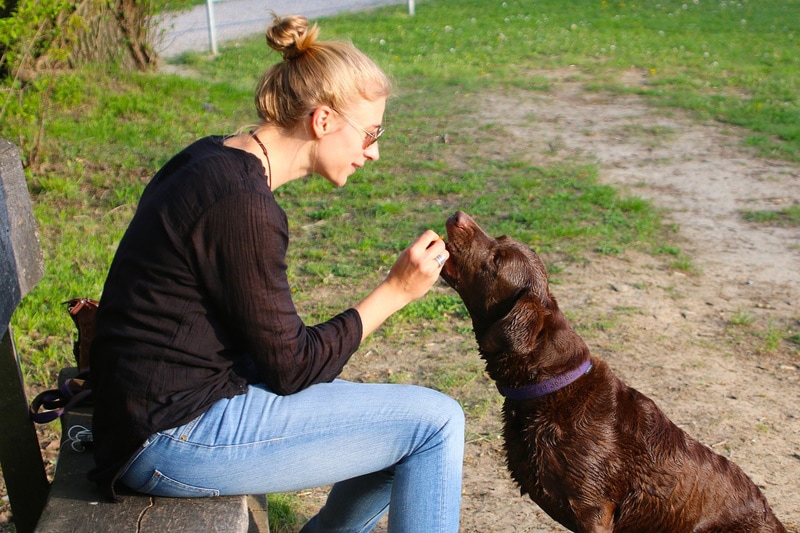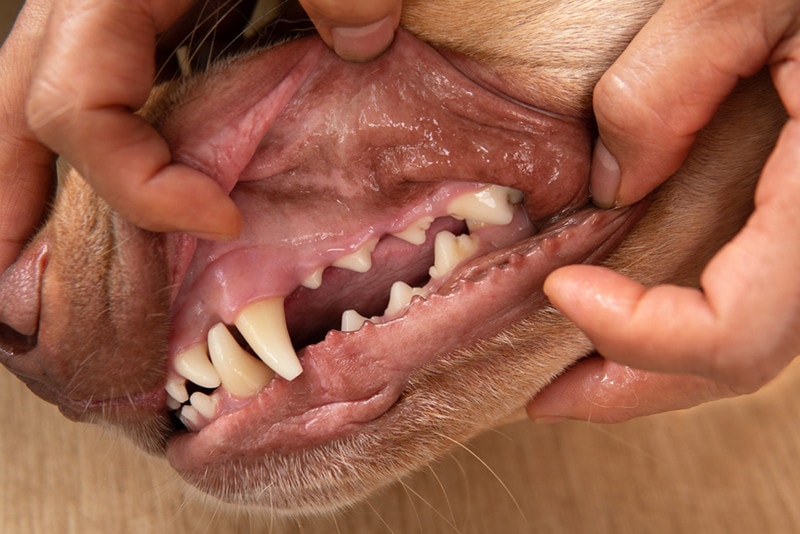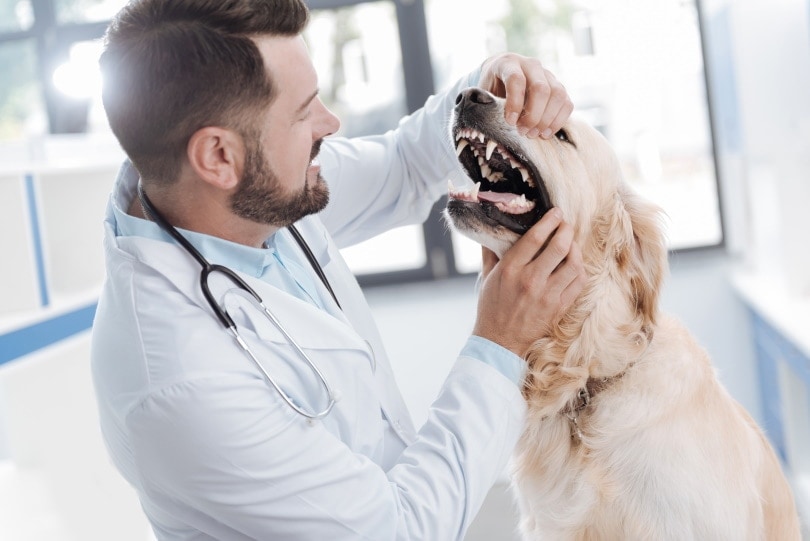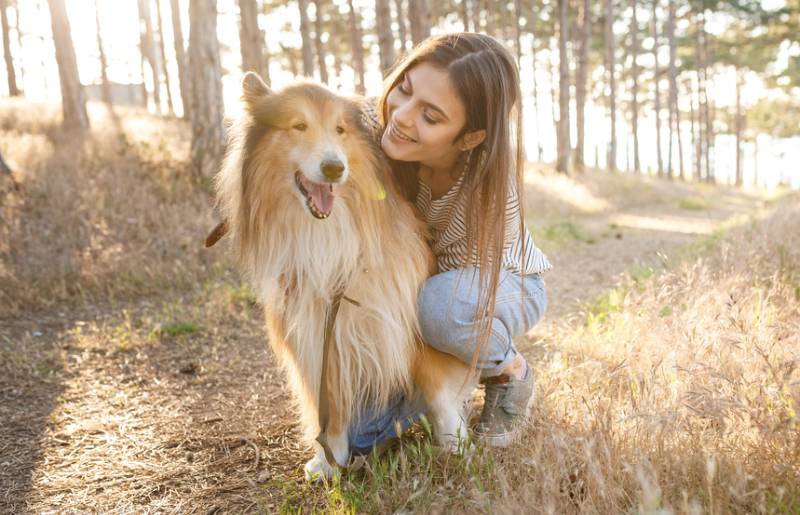My Dog’s Lips Are Turning Pink: Vet-Reviewed Advice & Recommendations
Updated on

Most dogs have black or darkly pigmented lips, but they can vary in color depending on the breed. If your dog’s lips turn pink, you’ll notice the difference, but more importantly, you’re probably wondering why your dog’s lips are turning pink. Should you be worried?
In many cases, your dog’s lip turning pink is nothing serious, but it’s always best to have them checked out by your veterinarian to look for any underlying causes that may need more investigation and treatment.
The color can be a temporary change or a permanent one, depending on the cause. A few factors are to blame for a dog’s lips turning pink, and in this post, we’ll explore the possible medical reasons why this happens and what, if anything, can be done about the problem.
Should I Be Worried?
If you notice your dog’s lips have turned pink, it’s wise to examine the mouth closer. If your dog’s mouth looks normal apart from pink lips, it may not be a cause of concern. However, pink lips could be an indicator of an underlying medical issue you’re unaware of. As stated, many cases are not serious and are not a worry, but it’s still wise to take your dog to the vet just in case.
Let’s take a closer look at what can cause your dog’s lips to turn pink.
- Age: As a dog ages, the body may produce melanin (pigment) at a slower rate, which can sometimes cause the lips to become pinker.
- Allergies: If your dog has underlying allergies and comes in contact with something he’s allergic to, the reaction can cause pink lips. Often, this is combined with swelling and irritation and other skin signs.
- Vitiligo: This uncommon skin condition can be categorized into two types—focal, which affects only one area, and generalized, which can occur in multiple areas of the body. In dogs, vitiligo starts when a dog is young and destroys melanocytes (cells that produce melanin). As the melanocytes die off, the result is white or pink pigmentation at the affected site. In dogs, the face, including the lips, is the most affected area. No treatment is available; however, the condition causes a dog no pain and is purely cosmetic.
- Infections: Fungal or bacterial infections can cause a dog’s lips to turn pink. Lip infections can be particularly common in dogs with prominent lip folds such as Bulldogs, Bassets and Spaniels.
- Mucocutaneous pyoderma (MCP) is a bacterial infection of the mucocutaneous junctions including the lips. It is most commonly due to an underlying cause, such as allergies and lip fold dermatitis, and can cause loss of pigmentation causing the lips to become more pink. Topical antibiotics are often used to treat the condition.
- Porphyrin: This naturally occurring substance is found in the tears and saliva and tends to show up as a brown or pink color wherever your dog has licked, dribbled, or produced excessive tears.
- Discoid lupus erythematosus (DLE): This autoimmune disease most commonly causes a loss of pigment on the nose, but rarely can affect the lips also. Diagnosis usually requires a biopsy.
- Uveodermatologic syndrome: This rare disease is when a dog’s immune system forms antibodies against its own pigment cells in the skin, which can cause skin depigmentation. It can also affect light-sensing cells in the back of the eye, causing red, painful eyes. The disease can cause impaired vision or blindness.
- Lymphoma of the skin: This form of cancer is the most serious cause of your dogs lips turning pink. Also known as cutaneous lymphoma, the condition is an abnormal lymphocyte replication that forms nodules, plaques, and lesions on the skin and the lip margins are an area that is commonly affected. Your veterinarian will perform a skin biopsy to diagnose and may do other tests such as chest x-rays and abdominal scans to check for spread of the cancer.

Tips for Keeping Your Dog Healthy and Safe
Dogs are curious beings and use their noses to investigate the world. Dogs with allergies may come in contact with something that can cause an allergic reaction, which can cause pink lips. Allergic reactions typically exhibit swelling, redness, or inflammation, so it’s wise to have your dog examined by your vet.
Many of the conditions mentioned are non-life-threatening and cause your dog little discomfort. However, lymphoma of the skin is a serious type of cancer that should be addressed as soon as possible. Always take your dog to the vet if you notice signs of something off, such as pink lips, just to be safe.
You can do your part in keeping your dog healthy by feeding a complete and balanced diet and providing adequate exercise suitable for your dog’s breed and size. Diseases and conditions can happen to any dog, regardless of their health and the food they eat, so it’s advisable to keep your dog up to date on all vaccines and routine checkups.

Conclusion
If your dog’s lips have turned pink, it’s often no cause for alarm, but it’s always best to get them checked over by your vet if you notice it. Your veterinarian can do an exam and may need to run some tests to help determine the cause, and administer treatment if need be.
- See also: Why Do Dogs Have Black Lips? Facts & FAQ
Featured Image Credit: Hebi B., Pixabay













